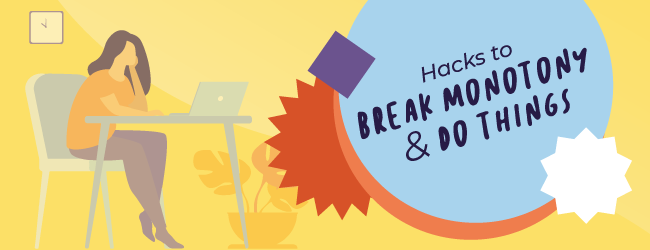
Work. Eat. Sleep. Repeat. Sounds familiar?
Maybe you are stuck in a loop that feels like a simulation of the same events, day in and out!
Experts say that monotony is the biggest enemy of productivity because:
It takes away our perseverance to finish tasks.
It causes a creative block.
So how do we think beyond our daily routine and make things interesting? Try out these actionable hacks to break the monotony:
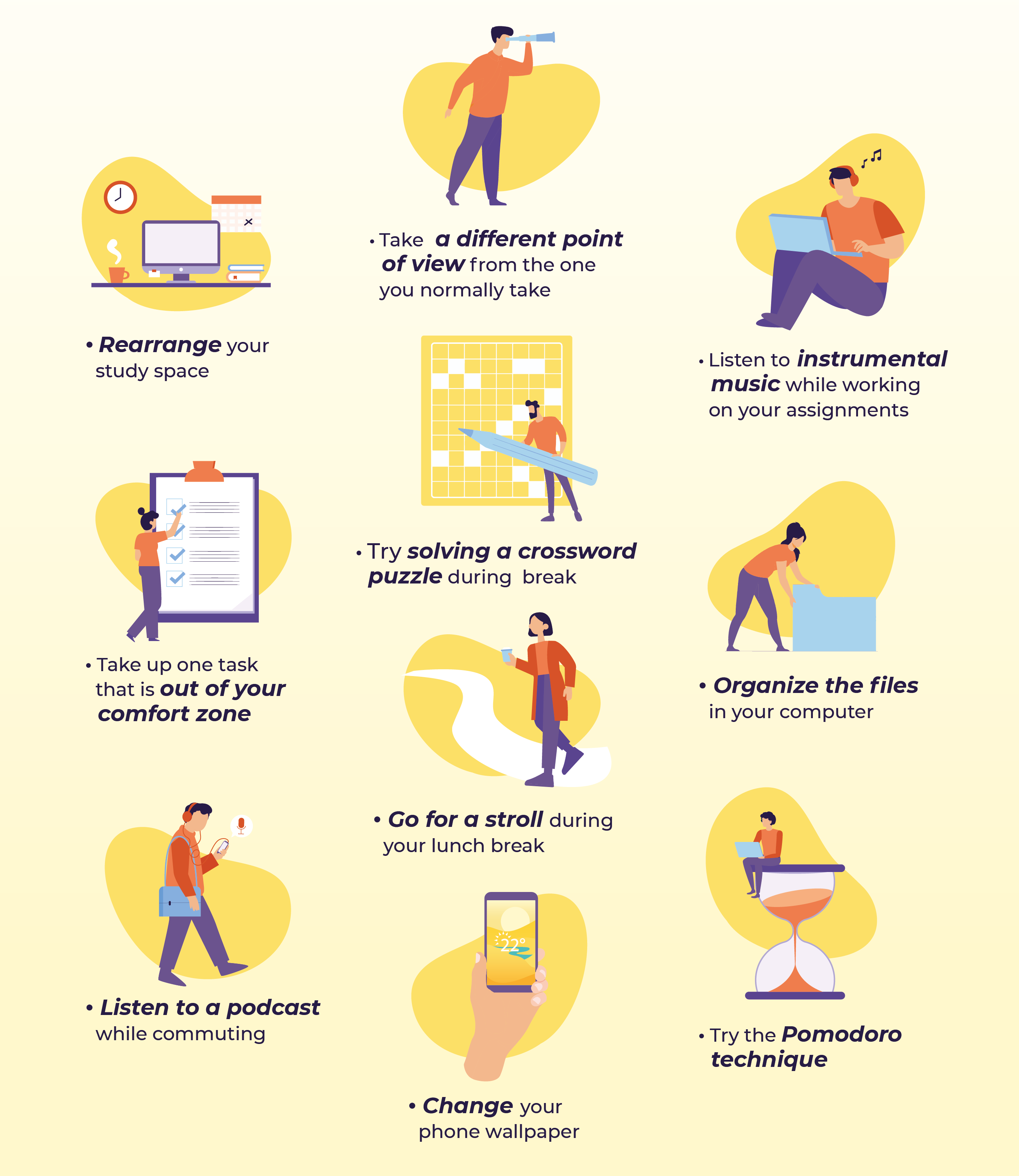
While daily routine is inevitable, we hope that these hacks will not let monotony deteriorate your creativity and productivity.
-----------------------------------------------------------------
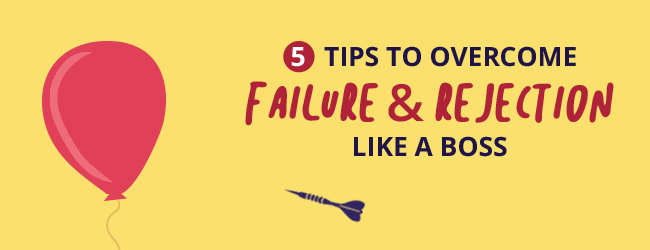
"Failure" & "Rejection" are such harsh words right? Deep inside, they seem to evoke the most basic human emotion, fear. Even worse, when this fear becomes a reality, things seem to spiral out of your control. Our self-esteem and self-worth take a major hit, and it isn't very easy to recover from.
But recovery is possible.
Here're 5 tips to recover from failure and rejection, and reclaim your life:

1. Get Proactive & Analyse What Went Wrong -
First, you need to proactively work on the very thing that put you in this predicament in the first place. Maybe it was an exam that you didn't do well in or an interview that you got rejected from. Sit down, give it some thought, maybe ask for feedback from others, and find out what exactly didn't go well, that led to this result. Work on remedying that.

2. Put those Positive Affirmations to Use -
This is an easy one. You just need to remind yourself that this one failure or rejection doesn't define you. Take a diary, or a piece of paper and write this down - "This <Insert your setback here> doesn't define me. I shall overcome this". Do it a few times every day. Guess what? You're going to find yourself believing in this more and more every single day you practice it, and this will aid you in your recovery.

3. Treat your "Injuries" -
Emotional pain activates the same portions of the brain as physical pain. So how does one recover from this? By maintaining good physical health. Get an extra hour of sleep than you usually do, map out your meals in advance, make sure that they're sufficient quantities of fruits and vegetables in your diet, stay hydrated, and exercise for at least 30 mins every day. This releases endorphins into your brain, which will improve your emotional well-being.

4. Practice Grounding Techniques
Grounding is the feeling of being fully present in your body. To achieve this, you can practice following your breath. Basically, close your eyes, and as you inhale, trace the air as it enters your nose and goes into your lungs. Now exhale and repeat the same steps again as the air leaves your body. Do multiple repetitions of this. This will help you clear your mind, and calm your emotions.
5. Keep a Gratitude Journal
Gratitude is a powerful form of positive thinking that boosts happiness. Every day, note down in a diary the things that you're thankful for in your life. Practice this daily, and you will see yourself recovering from your setback even more quicker.
-----------------------------------------------------------------

Do you think you’re a good listener? Or do you often feel you are unable to recall important parts of a recent conversation? Yes? No? Maybe? Whether it’s a meeting, a brainstorming session, or a conversation with a loved one, listening is pretty important, right? Wouldn't it be amazing if there was a hack to help you with that? Well here’s a tool actually used by psychologists universally - Active Listening, a communication technique to have you as the listener fully concentrate, understand, respond and then remember what is being said, which will be very beneficial to you:
Here’s how you can be an active listener -

1. Verbal Acknowledgement
As you’re listening to the other person, use verbal cues like “sure”, “I see”, “indeed”, etc. This provides the speaker with reinforcement that you are attentive, and encourages them to continue.
Caution: While these verbal cues are important, use them sparingly so as not to distract from what is being said or place unnecessary emphasis on parts of the message.

2. Non-Verbal Cues
Make proper eye contact, keep your posture alert and use appropriate gestures such as nodding, to demonstrate that you are listening.

3. Paraphrasing
Repeat or paraphrase what the speaker has said in order to show comprehension. This is a powerful skill that can reinforce the message of the speaker and demonstrate understanding. Eg. "So what you're saying is that with the help of this presentation we can create the exact module.."

4. Clarification
Clarification helps you better understand and give value to the person's speech. Clarification usually involves the use of open questions, raised politely, and enables the speaker to expand on certain points as necessary. Eg. “Could you explain what you meant by…?"
Caution: Do not interrupt the speaker. Ask your questions only once they’re done speaking.

5. Summarization
Summarization helps you extract the important information in the discussion, as well as convey the message of active listening to the speaker. It involves taking the main points of the received message and reiterating them in a logical and clear way, giving the speaker a chance to correct if necessary.
So get out there and show people just how great a listener you are, and in turn, boost your own learning in an endearing manner.
-----------------------------------------------------------------
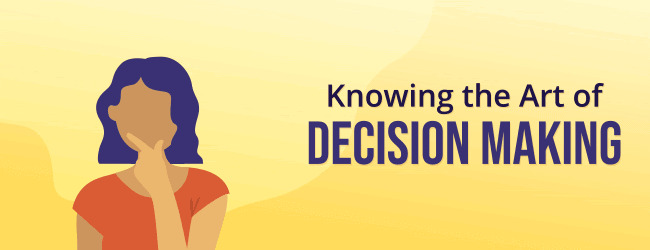
Decisions! Our life is pretty much the outcome of decisions we make right from the basic choices of what to eat, watch or wear to major decisions of career, relationships or relocation. But is making a decision really that simple? Are decisions just black or white, yes or no, good or bad?
The answer is no and no.
Research shows that decisions are prone to cognitive biases - the tendency to make decisions or take action in an illogical way based on several factors.
Let's take a quick dive into the most common psychological biases that make us faulty decision-makers.
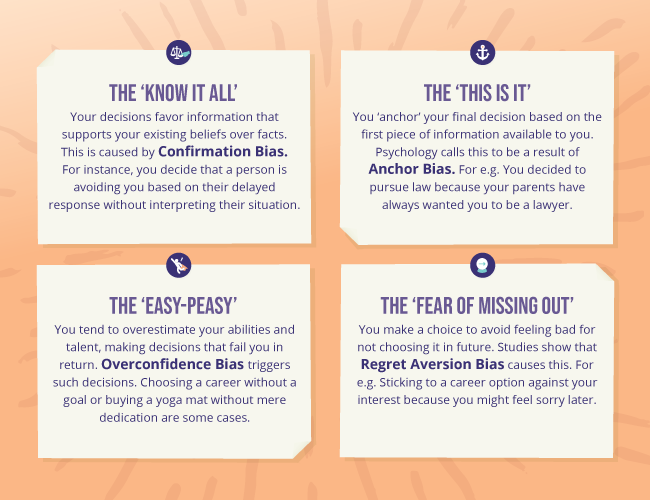
At this point, you must be wondering, "So how does one become a better decision maker?". Well, with the amount of time and energy it takes to weigh the plenty of options available in today’s world, it is okay to feel overwhelmed while making decisions but here’s a tip.
When in doubt, wear your sorting hat:
"Six Thinking Hats" is a powerful psychological technique that you can practice to sort your decisions whenever you feel "not so sure" by looking at them from all possible angles.
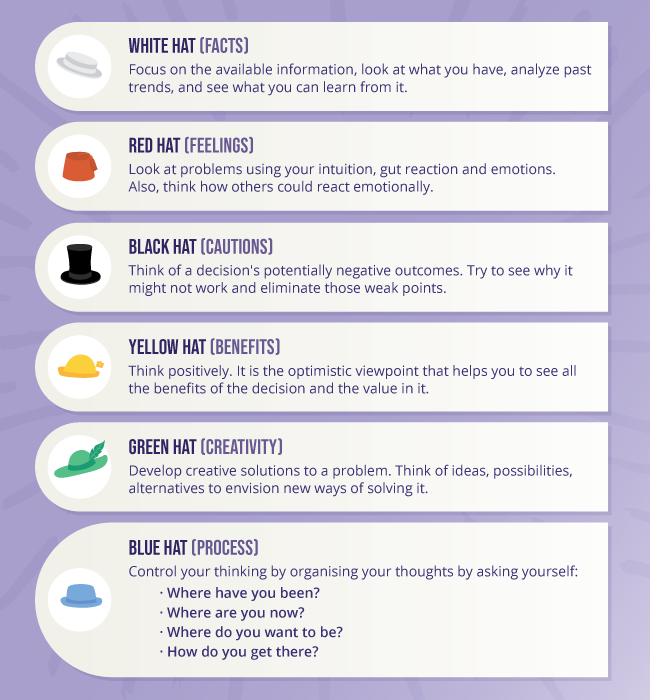
Decision-making is no less than a maze wherein you decide on how to decide. If you ever feel stuck in the middle of a decision, you can seek professional guidance from our experts round the clock!
-----------------------------------------------------------------
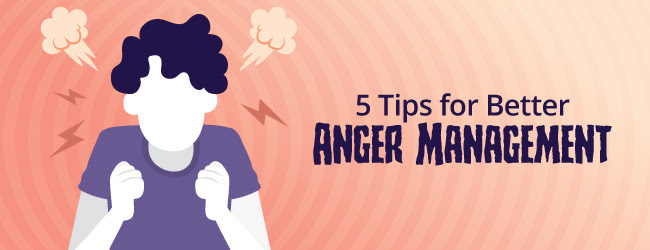
Do you often get angry? Yes, we all do. It is a part of being human but do you often find yourself blaming others for your anger? Well, then you need to get a strong grip over this pesky emotion.
With the current life hassles, it can only get easier for your anger to build up and shape into frustration and stress. But here’s the catch - anger is not necessarily bad provided, it is managed well. Research shows that letting it rip with anger actually escalates aggression, which negatively affects your physical health and emotional wellbeing.
So how do you control your anger before it controls you? Here are some quick tips to help you keep your anger at bay.
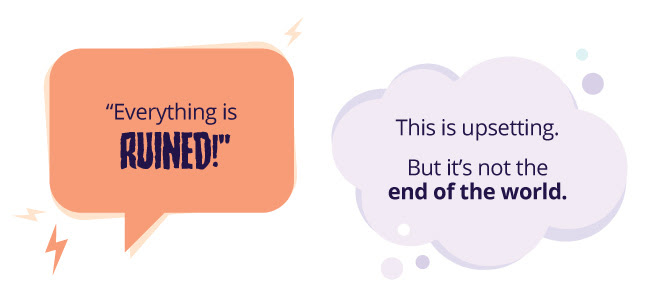
1. Reframing your thoughts
Anger magnifies your inner thoughts, making it easy to feel like things are worse than they really are. Cognitive restructuring can help you identify and replace negative thoughts with more reasonable ones. Instead of thinking "Everything is ruined," for example, tell yourself "This is upsetting, but it's not the end of the world, and getting angry is not going to fix it anyhow."
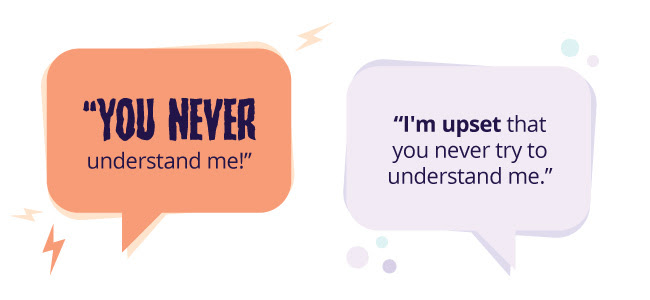
2. Pick your words wisely
Avoid words like "never" or "always" when talking about yourself or others. Statements like "This never works" or "You're always forgetting things" make you feel your anger is justified. "I" statements can be magical here. To avoid criticizing or placing blame which might only increase tension, use "I" statements to describe the problem.
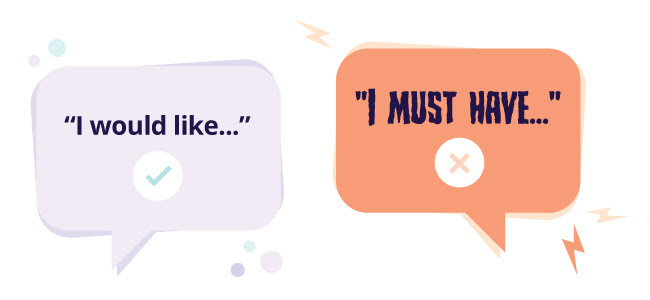
3. Translating expectations into desires
Angry people tend to demand things, whether it's fairness, appreciation, agreement, or willingness to do things their way. Try to change your demands into requests. And if things don’t go your way, try not to let your disappointment turn into anger. Saying, "I would like" something is healthier than saying, "I demand" or "I must have" something.
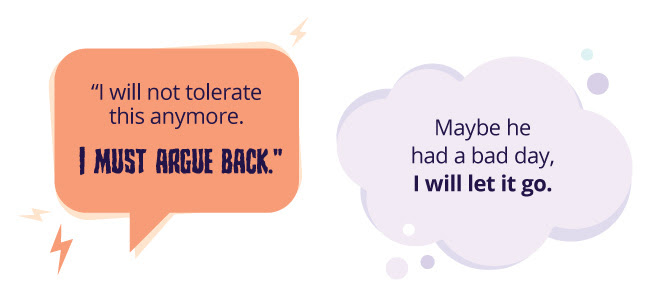
4. Take a pause
You often jump to conclusions when you’re angry, and end up saying the first thing that comes into your head. Take a timeout. Go for a brisk walk, indulge in some physical activity, or watch something funny. This will reduce the induced stress and help you with a few moments of quiet time to collect your thoughts and understand what triggered your anger.
5. Relax and learn to let go
It is natural to rethink, reconsider and relive the situation that provoked your anger to a point where you begin to ruminate. At first, you may just be irritated, but the more you think and talk about it, the angrier you become. So it is always a good idea to let go and here’s something that might just do the trick.
You can follow these quick and simple tips to keep your temper in control.
Step 1: Move away from the situation/people for a few minutes.
Step 2: Place the palm of one hand on your heart and that of the other hand on your stomach. Take 5-10 deep breaths.
Step 3: Visualize a pleasant scene/memory for some time.
Step 4: Spread your fingers to form a star-like shape and start tracing your fingers.
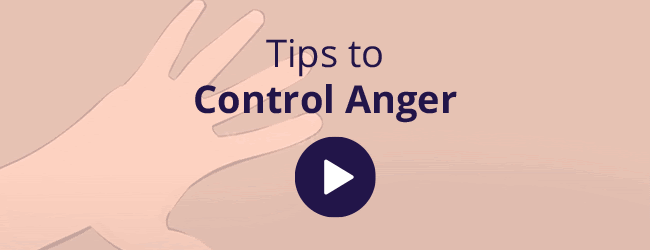
-----------------------------------------------------------------
The halts we have been through in recent times have forced many of us to change the way we go about our daily lives. With those changes, some of us are experiencing a wave of losses: emotional. economic, social, and physical. For some, these losses may build up and lead to feelings of grief.
So today we're going to talk about Grief - a natural response to loss. It’s the emotional suffering you feel when something or someone you love is taken away. Often, the pain of loss can feel overwhelming. you may experience all kinds of difficult and unexpected emotions, from shock or anger to disbelief, guilt, and profound sadness. The pain of grief can also disrupt your physical health, making it difficult to sleep, eat, or even think straight.
Coping with the loss of someone or something you love is one of life’s biggest challenges. You may associate grieving with the death of a loved one - which is often the cause of the most intense type of grief - but any other loss can also cause grief. For example, divorce or relationship breakup, loss of health, losing a job, a miscarriage, loss of a friendship, a loved one’s serious illness, etc.
Whatever your loss is, it’s your personal thing and you shouldn't feel embarrassed about how you feel, or believe that it’s somehow only appropriate to grieve for certain things. If something or someone was significant to you, it’s normal to grieve the loss you’re experiencing. Just because you cannot see the emotional wounds like physical wounds, doesn’t mean you aren’t suffering.
Symptoms of grieving:
While loss affects people in different ways, many people experience the following symptoms when they’re grieving. Just remember that almost anything that you experience in the early stages of grief is normal—including feeling like you’re going crazy, feeling like you’re in a bad dream, or questioning your religious or spiritual beliefs.
Shock and disbelief: Right after the loss, it can be hard to accept what has happened or one can even deny the truth. You may keep expecting the lost one to show up, even though you know they’re gone.
Sadness: You may experience profound sadness, feelings of emptiness, despair, and loneliness. You may also feel emotionally unstable.
Guilt: You may regret or feel guilty about things you did or didn’t say or do. You may even feel guilty for not doing more to prevent your loss, even if it was completely out of your hands.
Anger and Fear: Even if the loss was nobody’s fault, you may feel angry with yourself, God, the doctors, or even with the person who left you for abandoning you. A significant loss can trigger a host of worries and fears. You may feel anxious, helpless, or insecure.
So there is no right or wrong way to grieve, but there are healthy ways to deal with this. And to have a better understanding let's get to know about few Myths and Facts about grieving:
Myth: The pain will go away faster if you ignore it.
Fact: Ignorance will only make it worse. For real healing, it is necessary to face the grief and actively deal with it.
Myth: If you don’t cry, it means you aren’t sorry about the loss.
Fact: Crying is a normal response to sadness, but it’s not the only one.
Myth: Grieving should or shouldn’t last for a long time.
Fact: Every individual is different and so is their healing period. So there is no specific time frame for grief.
Myth: Moving on with your life means forgetting your loss.
Fact: Moving on means you’ve accepted your loss- but that’s not the same as forgetting. You can move on with your life and keep the memories.
Ways to Cope
While grieving a loss is an inevitable part of life, there are ways to cope with the pain, come to terms with your grief, and eventually, find a way to pick up the pieces and move on with your life.
- » Acknowledge your pain. Denial will not help. You can try to suppress your grief, but you can’t avoid it forever.
- » Accept that grief can trigger many different and unexpected emotions and if you have any kind of emotion is absolutely ok.
- » Understand that your grieving process will be unique to you. Don’t be hard on yourself and please avoid comparing. It’s easy to compare ourselves to individuals who are coping differently with the current situation. Especially when we’re already feeling low, it can drain us of our limited energy and can lead to resentment towards others and towards ourselves. Instead, focus on your own strengths and coping strategies. Listing your strengths and issues you have overcome is an effective way of highlighting and celebrating your own ability to cope.
- » Cry it out if you want to. Express your emotions. Talk about your loss, and the happy and unhappy memories.
- » Accept that many people feel awkward when trying to comfort someone who is grieving. Grief can be confusing, sometimes frightening emotion for many, especially if they haven’t experienced a similar loss themselves. So it's ok if someone doesn’t understand it. But don’t use that as an excuse to retreat into your shell and avoid social contact. If a friend or loved one reaches out to you, it’s because they care.
- » Express your feelings in a tangible or creative way. Even if you’re not able to talk about your loss with others, it can help to write down your thoughts and feelings in a journal, for example. Or you could release your emotions by making a scrapbook or volunteering for a cause related to your loss.
- » Fix your routine. At a time when life feels particularly chaotic, setting a routine is important and ensures we have a mixture of social, physical, and educational activities in our day. The routine doesn’t mean rigidity, but it can offer a sense of control.
- » Support yourself emotionally by taking care of yourself physically. A little bit of body movement through yoga or any kind of physical workout will help you.
- » Try to maintain your hobbies and interests. There’s comfort in routine and getting back to the activities that bring you joy and connect you closer to others can help you come to terms with your loss and aid the grieving process
- » Draw comfort from your faith. If you follow a religious tradition, embrace the comfort its mourning rituals can provide. Spiritual activities that are meaningful to you—such as praying, and meditating.
- » Seek out support from the people in family and friends who care about you or even you can go for professional support.
“All the art of living lies in a fine mingling of letting go and holding on.” - Havelock Ellis
-----------------------------------------------------------------
So this time I am looking forward to talking about Mental health which includes our emotional, psychological, and social well-being. It affects how we think, feel, and act. It also helps determine how we handle stress, relate to others, and make healthy choices. Mental health is important at every stage of life, from childhood and adolescence through adulthood.
These days Mental Health has become a major concern and people of all ages are getting affected. A disturbing work-life balance adds up to levels of stress and anxiety. But don't worry. You are not alone. We are always there to support and guide you through such tough phases of life. For us, the mental health and well-being of the IIIT-D community are very important. So feel free to share your emotional, psychological, and behavioral concerns with us, and being empathetic, non-judgmental, and a good listener we will support and guide you to deal with your issues.
Well-being Cell counseling services are just a call away. Confidentiality of your interaction during the sessions will be strictly maintained. So always feel free to talk about anything and everything that somehow is triggering your stress.
Also, we offer you guys 24x7 online counseling services in association with YourDost. For you, all their services are also free of cost. You just need to sign up with your IIIT-D's email ids.
So always keep in mind that life is beautiful and ups and downs are part of everyone's life which somehow makes life interesting as well. We just need to stay strong and always hopeful.
Always keep reminding yourself that Worrying Solves Nothing. And if there are problems/challenges in life, solutions to them are also there. Many times we get to fix our issues on our own, but when you find yourself not able to help yourself, please don't hesitate to ask for help. Infect asking for help is considered as a courageous move. Let's break the stigma around seeking mental health support by being together and supporting each other.
Take good care of yourself.
You can be un-silent. You can live well with a good mental health condition, as long as you open up to somebody about it. -Demi Lovato
😊 Thank you 😊
-----------------------------------------------------------------

"I wish I was full of samosas instead of emotions"
Ever find yourself thinking this way?
Sigh! Emotions, Feelings - pesky little creatures, running wildly, sometimes throwing logic and rational thinking out of the window. But are they really a bad thing? After all, they're what make us human, right?
So how does one measure if they’re managing their emotions well or if they need to work on it a bit? Turns out, there’s another form of intelligence we’ve been neglecting; emotional intelligence. It’s the ability to manage our emotions instead of letting them control us.
It's super useful too. Studies show that people with a high emotional intelligence quotient (EIQ) are not only more successful in life, but also display higher levels of empathy, self-awareness, and interpersonal skills.
So what’s your EIQ, you ask? Take our EIQ Test to find out.
Go ahead, unleash the best version of yourself!
-----------------------------------------------------------------
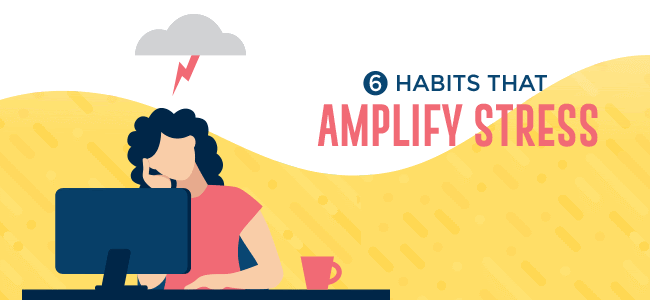
Stress! What a stressful word right? And yet, it’s pretty standard and even necessary to boost our productivity. However, it’s the chronic sibling of stress that can get counterproductive as well as harmful. What we don’t realize is that we might unconsciously be indulging in certain habits which we don’t realize only amplify our stress levels. So what might these be?
Here’re some common stress amplifying habits that you might want to be wary of:

1. Sleep deprivation
For many of us, staying up late is very common. But it’s a problem if this comes at the cost of the number of hours of sleep you get. Several studies have shown that skimping on sleep impairs your creativity, productivity, ability to focus, and problem-solving skills.
So maybe say “no” to that next Netflix episode coming up in 30 secs and hit the sack an hour earlier today.

2. Caffeine
A morning cup of coffee is like a cup of heavenly elixir to some, and for good reason. Caffeine can improve mental alertness and enhance memory. However, Caffeine consumed at odd hours or in excessive quantities interferes with sleep. Studies show that caffeine consumed 6 hours before bedtime reduces total sleep time by 1 hour.
So be mindful of your consumption of coffee, tea, chocolate, energy drinks, etc.

3. Messy Room
Is your workstation scattered with random items? Clutter creates stress that has two major biological and neurological effects on us—an increase in the levels of cortisol, a stress hormone, and a restriction of our brain’s capacity to focus and perform creative tasks. So tidying up your study space might be a great idea right now.

4. Couch Potato
No matter how busy you are, try to squeeze at least 30 minutes of some physical activity into your schedule. Exercise indoors, finish some home chores, go for a walk or do some regular stretching for a while. Physical activities have direct stress-busting benefits and regulate emotions.

5. No Breaks
It’s a must to take a pause to restart, refresh and refuel. Taking frequent breaks is the key to productivity. Schedule breaks for short amounts of time in between your studies. Lighten up, read something funny, or watch some videos on Youtube.

6. Poor Hygiene
Well, let's be honest, while staying at home, we might be guilty of skipping showers. The fact is that saving those extra 15 minutes would not make much of a difference. A quick shower will make you feel less drowsy and lethargic. So go on, soak up.
So, what do you think? Can you avoid these habits? Not so tough right?
-----------------------------------------------------------------

Do you see yourself through others' opinions? Do words like 'I'm not good enough or ‘What will they think of me' influence your life decisions? Don't feel disheartened. We all have heard these little whispers of self-doubt at some point.
No one's born confident. We all grow into it by having our own share of the journey. According to a study, confidence is contingent - it varies from person to situation. For example, one might be confident in academics while not so much in public speaking.
So how does one foster confidence? Here are 4 mind hacks to adopt when feeling low on confidence.

1. Practice Self-affirmation
A 2015 study states that "Individuals who experience self-doubt overly focus on imperfections and their fear of failure". Practicing self-affirmation is as simple as saying positive things about yourself or situations that make you feel uncertain. Studies have proven that positive statements improve one's confidence and creative problem-solving.

2. Avoid Over-apologizing
According to psychology, people who over-apologize are often anxious and worry about offending everyone around them. This habit of saying sorry in turn reflects a lack of confidence and insincerity. Rather take a step back, phrase a firm yet compassionate reply and try to turn the apology into gratitude.

3. Talk to Yourself
Have you ever stood in front of a mirror saying, “You are awesome,” or “Today I’m going to rock that interview”? We all have done it but you’d be surprised to know that according to studies, mirrors induce a self-focused state which increases Heart Rate Variability (HRV). Higher HRV is associated with a greater ability to self-soothe when feeling less confident.
4. Self-rewards
The journey to building confidence begins with self-appreciation and finding pride in even small things. We’re often so tangled in our own negativity that we forget to celebrate small victories. Studies show that healthy pride represents a positive notion of self-worth.
So next time you feel inferior in any way, follow this quick exercise to recognize and acknowledge things that you are proud of:

Remember everyone struggles with confidence. It’s not something that can be achieved overnight. But regular practice will definitely help in becoming a confident person.
-----------------------------------------------------------------
Coming Soon....
Coming Soon....
Coming Soon....
Coming Soon....
Coming Soon....
Coming Soon....
Coming Soon....
Coming Soon....
Coming Soon....
Overthinking is exhausting. When you overthink, you find yourself stuck and unable to move forward. More so, you start coming up with bizarre ideas that totally contradict each other. You start blaming yourself for things you didn’t do and worrying about scenarios that may or may not happen.
Overthinking is simply the act of “thinking about something too much or for too long.” Studies have shown that overthinking elevates your stress levels, reduces your creativity, clouds your judgment and reduces your power to make decisions.
Fortunately, there are a few ways to handle overthinking:
1. Change the story you tell yourself.
As they say that we are the stories we tell ourselves. So what you repeatedly say to yourself — and how you repeatedly describe yourself — is what you come to believe and be. Everything we do and experience stems from our identity and underlying set of beliefs.
Identify those limiting beliefs and make it a conscious effort to stop yourself whenever you catch yourself voicing them. Immediately replace those negative narratives with positive, empowering thoughts like “I am the in-charge of my emotions”, “I think clearly” and, “I’m a decision-maker".
This is how you change your self-perception and begin to win back your power.
2. Focus on what you can control.
When you find yourself worrying, take a minute to examine the things you have control over. First, acknowledge what’s on your mind. Second, take a step back and broaden your perspective. Ask yourself: "What can I Control?"
For e.g. If you’re struggling financially and ruminating about how you’re going to pay the bills — that doesn’t help. What helps is looking at your expenses and thinking, ‘what can I cut or eliminate from my bills?’ Then ask ‘what other revenue streams can I create?’ This is how you shift your attention from what you can’t control, to what you can.
3. Identify your fears/thoughts.
Very often, it’s the irrational fears/thoughts that arise in our minds that lead to overthinking. We fear what others might think, we fear to make a mistake, we fear not being good enough to succeed. And living in that fear will tangle us in a well of indecision.
"We suffer more often in imagination than in reality."
Fear, which often stems from the imagination of “what might be”, contributes to your overthinking. And one of the best strategies to beat fear is to simply take action. Take a small step in the direction of your fear and see what happens. The moment you take action is the moment you win a battle with your overthinking. Win more battles with more action.
"Fear can be effectively cured by forced repetition of acts of courage."
4. Write your thoughts instead of looping them in your brain.
This may sound like a clichéd answer to everything but it works in most of the cases. Note down your thoughts with a vision to resolve rather than ruminating further. Research shows that the habit of writing what we feel helps us with metacognitive thinking.
Metacognition is our “awareness of our own thoughts.” That’s why you become more aware of your thoughts and what they’re trying to tell you when you write them down. The goal is to become more aware of your thoughts to understand what they are, are they logical and why you’re feeling them.
5. Let go of the past.
Over thinkers often ruminate about the past. When they do so, they’re exerting energy on the “what if” and “I wish” and “I should have” … But that energy is removing them from the present moment. The past cannot be changed — but you can figure out the lessons, meanings and perspectives out of the part.
When you accept the past for what it was, you relieve yourself from its weight. You will then free your mind from the burdens, mistakes or grudges of the past that stop you from taking action in the present.
6. Stop your thoughts in the moment and practice being in the present.
In the heat of overthinking, stop and say: “No. I’m not going to have these thoughts right now. I’m not going to give in.”
Breathe. Focus. Where are you? Engage yourself in something pleasant. Overthinking as a habit is powerful. Therefore, spend time doing activities that are highly captivating and positive to your senses.
“The past doesn’t matter. The future is out of my reach. All I have in my control is this present moment. So I will stop thinking about the past or the present. I will only think about the here and now.”
7. Share with someone else to gain a different perspective.
Being open and honest about your thoughts and sharing them with someone you trust can offer a new “out of the box” perspective. And in case you don't find anyone with whom you can share, never feel hesitant in asking for some professional help.
“There is hope, even when your brain tells you there isn’t.” — John Green
Hello dear friends ...
The COVID-19 pandemic has forced many of us to change the way we go about our daily lives. With those changes, some of us are experiencing a wave of losses: economic, social, physical and emotional. For some, these losses may build up and lead to feelings of grief.
So this time we're going to talk about Grief - a natural response to loss. It’s the emotional suffering you feel when something or someone you love is taken away. Often, the pain of loss can feel overwhelming. you may experience all kinds of difficult and unexpected emotions, from shock or anger to disbelief, guilt and profound sadness. The pain of grief can also disrupt your physical health, making it difficult to sleep, eat, or even think straight.
Coping with the loss of someone or something you love is one of life’s biggest challenges. You may associate grieving with the death of a loved one - which is often the cause of the most intense type of grief - but any other loss can also cause grief. For example, divorce or relationship breakup, loss of health, losing a job, a miscarriage, loss of a friendship, a loved one’s serious illness etc.
Whatever your loss is, it’s your personal thing and you shouldn't feel embarrassed about how you feel, or believe that it’s somehow only appropriate to grieve for certain things. If something or someone was significant to you, it’s normal to grieve the loss you’re experiencing. Just because you cannot see the emotional wounds like physical wounds, doesn’t mean you aren’t suffering.
Symptoms of grieving:
While loss affects people in different ways, many people experience the following symptoms when they’re grieving. Just remember that almost anything that you experience in the early stages of grief is normal—including feeling like you’re going crazy, feeling like you’re in a bad dream, or questioning your religious or spiritual beliefs.
Shock and disbelief: Right after the loss, it can be hard to accept what has happened or one can even deny the truth. You may keep expecting the lost one to show up, even though you know they’re gone.
Sadness: You may experience profound sadness, feelings of emptiness, despair, loneliness. You may also feel emotionally unstable.
Guilt: You may regret or feel guilty about things you did or didn’t say or do. You may even feel guilty for not doing more to prevent your loss, even if it was completely out of your hands.
Anger and Fear: Even if the loss was nobody’s fault, you may feel angry with yourself, God, the doctors, or even with the person who left for abandoning you. A significant loss can trigger a host of worries and fears. You may feel anxious, helpless, or insecure.
So there is no right or wrong way to grieve, but there are healthy ways to deal with this. And to have a better understanding let's get to know about few Myths and Facts about grieving:
Myth: The pain will go away faster if you ignore it.
Fact: Ignorance will only make it worse. For real healing, it is necessary to face the grief and actively deal with it.
Myth: Be strong in the face of loss.
Fact: Feeling sad, frightened, or lonely is a normal reaction to loss. Crying doesn’t mean you’re weak.
Myth: If you don’t cry, it means you aren’t sorry about the loss.
Fact: Crying is a normal response to sadness, but it’s not the only one.
Myth: Grieving should or shouldn’t last for a long time.
Fact: Every individual is different and so is their healing period. So there is no specific time frame for grief.
Myth: Moving on with your life means forgetting your loss.
Fact: Moving on means you’ve accepted your loss- but that’s not the same as forgetting. You can move on with your life and keep the memories.
Ways to Cope
While grieving a loss is an inevitable part of life, there are ways to cope with the pain, come to terms with your grief, and eventually, find a way to pick up the pieces and move on with your life.
- Acknowledge your pain. Denial will not help. You can try to suppress your grief, but you can’t avoid it forever.
- Accept that grief can trigger many different and unexpected emotions and you having any kind of emotion is absolutely ok.
- Understand that your grieving process will be unique to you. Don’t be hard on yourself and please avoid comparing. It’s easy to compare ourselves to individuals who are coping differently with the current situation. Especially when we’re already feeling low, it can drain us of our limited energy and can lead to resentment towards others and towards ourselves. Instead, focus on your own strengths and coping strategies. Listing your strengths and issues you have overcome is an effective way of highlighting and celebrating your own ability to cope.
- Cry it out if you want to. Express your emotions. Talk about your loss, the happy and unhappy memories.
- Accept that many people feel awkward when trying to comfort someone who is grieving. Grief can be confusing, sometimes frightening emotion for many, especially if they haven’t experienced a similar loss themselves. So it's ok if someone doesn’t understand it. But don’t use that as an excuse to retreat into your shell and avoid social contact. If a friend or loved one reaches out to you, it’s because they care.
- Express your feelings in a tangible or creative way. Even if you’re not able to talk about your loss with others, it can help to write down your thoughts and feelings in a journal, for example. Or you could release your emotions by making a scrapbook or volunteering for a cause related to your loss.
- Fix your routine. At a time when life feels particularly chaotic, setting a routine is important and ensures we have a mixture of social, physical and educational activities in our day. Routine doesn’t mean rigidity, but it can offer a sense of control.
- Support yourself emotionally by taking care of yourself physically. Little bit of body movement through yoga or any kind of physical workout will help you.
- Try to maintain your hobbies and interests. There’s comfort in routine and getting back to the activities that bring you joy and connect you closer to others can help you come to terms with your loss and aid the grieving process
- Draw comfort from your faith. If you follow a religious tradition, embrace the comfort its mourning rituals can provide. Spiritual activities that are meaningful to you—such as praying, meditating.
- Seek out support from the people in family and friends who care about you or even you can go for professional support.
"All the art of living lies in a fine mingling of letting go and holding on." - Havelock Ellis
I hope you find this helpful. Please take care of your mind and body and always remember that we care about your emotional and psychological well-being. Feel free to approach us. Appointments for the sessions at Well-being Cell can be booked here.
So Let's talk about taking control of life by cultivating an active mindset. We all are more than capable of seizing control of our life and our healing. Some of us may have to work harder than others, but we are all capable and deserving of creating a better future for ourselves. The faster we start to realize this, the sooner things will start to improve. Hold yourself accountable for your behaviors and habits that work against your overall wellbeing. Get uncomfortable and challenge yourself to do better and be better. Be disciplined, stay committed and protect your energy by holding boundaries.
Self reflection prompt: Which one of these do you need to focus on more?
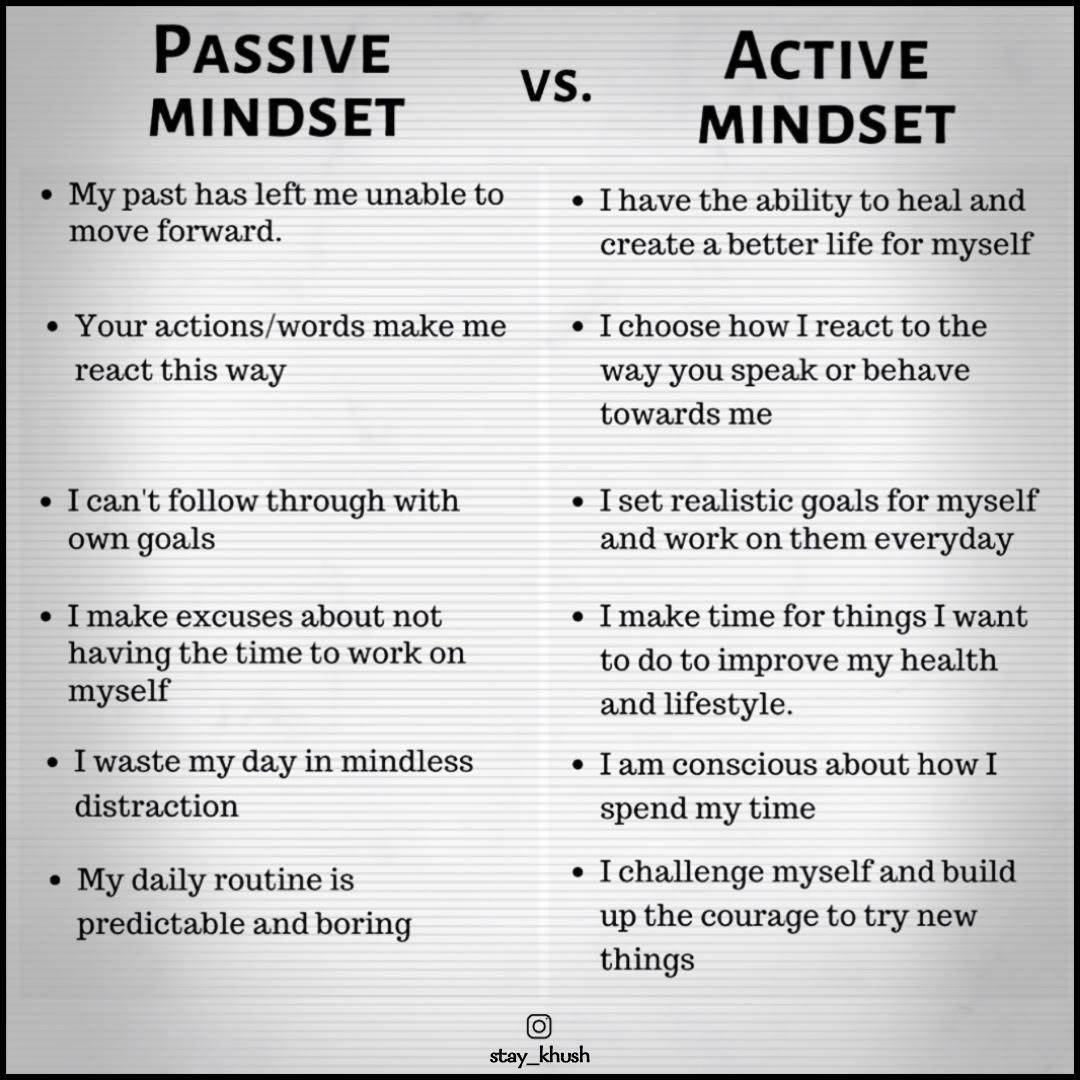
Active minds that think and study, like swift brooks, are seldom muddy. - Arthur Guiterman
Please take care of your mind and body and always remember that we care about your emotional and psychological well-being. Feel free to approach us. Appointments for the sessions can be booked here.
So today I just felt like sharing an important tool with you all, which might help in regulating emotions.
One of the best ways to work through your emotions is by writing them down. If you can record how you are feeling and what are you thinking, you are better able to track your emotions and notice the triggers/warning signs. Putting down our problems on paper often helps us identify the cause and find a solution more clearly.

The above image reflects kind of a "mood journal". The questions in it prompt you to record your feelings and work through them. Once you start recording for several days or weeks, you will begin to notice certain patterns/trends. By recognizing these trends, you can work on eliminating those triggers.
Working on improving your emotional health doesn't not mean you will find a solution to your triggers right away. This takes time and require repeated practice.
Emotion regulation is extremely significant for a whole constellation of problems people encounter. - Richard Davidson
Please take care of your mind and body and always remember that we care about your emotional and psychological well-being. Feel free to approach us. Appointments for the sessions can be booked here.
This time we are going to talk about the vital role of a positive life approach in one's life. The people who succeed aren’t the ones who avoid failure; they’re the ones who learn how to respond to failure with optimism.
"Optimism is a happiness magnet. If you stay positive, good things and good people will be drawn to you." - Mary Lou Retton
Change and challenges are part and parcel of life. At times, how to deal with these changes/challenges become difficult for many of us. How you respond to these challenges make a difference in life. Developing a positive attitude can make your path easy. Researchers have found that positive thinkers:
- Live healthier lives
- Have successful careers
- Make better decisions
- Are less stressed
- Have healthier relationships
Positive thinking is a choice that can be learned. So hereby, we are sharing a small document (PFA) which may help you in building a positive mindset. We suggest you please have a look at it and get benefitted.
Download PDF here.
Always remember that we care about your emotional and psychological well-being. Feel free to approach us. Appointments for the sessions can be booked here.
These COVID19 Pandemic times are very difficult for each one of us. Mental Health has become a major concern in this scenario and people of all ages have been afflicted. Work and study from home during such times adds up to the levels of stress and anxiety.
But don't worry. You are not alone. We are always there for you. For us mental health and well-being of the IIIT-D community is very important. So feel free to share your emotional, psychological and behavioral concerns with us, and we will help you deal with your concerns, empathically.
Our Well-being Cell's counseling services can be availed online during this lockdown period. Confidentiality of your interaction during the sessions will be strictly maintained. Appointments for sessions can be booked here.
Whether you're guffawing at a sitcom on TV or quietly giggling at a newspaper cartoon, laughing does you good. Laughter is a great form of stress relief, and that's no joke.
A good sense of humor can't cure all ailments, but data is mounting about the positive things laughter can do.
Short-term benefits
A good laugh has great short-term effects. When you start to laugh, it doesn't just lighten your load mentally, it actually induces physical changes in your body. Laughter can:
Stimulate many organs. Laughter enhances your intake of oxygen-rich air, stimulates your heart, lungs and muscles, and increases the endorphins that are released by your brain.
Activate and relieve your stress response. A rollicking laugh fires up and then cools down your stress response, and it can increase and then decrease your heart rate and blood pressure. The result? A good, relaxed feeling.
Soothe tension. Laughter can also stimulate circulation and aid muscle relaxation, both of which can help reduce some of the physical symptoms of stress.
Long-term effects
Laughter isn't just a quick pick-me-up, though. It's also good for you over the long term. Laughter may:
Improve your immune system. Negative thoughts manifest into chemical reactions that can affect your body by bringing more stress into your system and decreasing your immunity. By contrast, positive thoughts can actually release neuropeptides that help fight stress and potentially more-serious illnesses.
Relieve pain. Laughter may ease pain by causing the body to produce its own natural painkillers.
Increase personal satisfaction. Laughter can also make it easier to cope with difficult situations. It also helps you connect with other people.
Improve your mood. Many people experience depression, sometimes due to chronic illnesses. Laughter can help lessen your depression and anxiety and may make you feel happier.
Improve your sense of humor
Are you afraid you have an underdeveloped — or nonexistent — sense of humor? No problem. Humor can be learned. In fact, developing or refining your sense of humor may be easier than you think.
Put humor on your horizon. Find a few simple items, such as photos, greeting cards or comic strips, that make you chuckle. Then hang them up at home or in your office. Keep funny movies, books, magazines or comedy videos on hand for when you need an added humor boost. Look online at joke websites. Go to a comedy club.
Laugh and the world laughs with you. Find a way to laugh about your own situations and watch your stress begin to fade away. Even if it feels forced at first, practice laughing. It does your body good.
Consider trying laughter yoga. In laughter yoga, people practice laughter as a group. Laughter is forced at first, but it can soon turn into spontaneous laughter.
Share a laugh. Make it a habit to spend time with friends who make you laugh. And then return the favor by sharing funny stories or jokes with those around you.
Knock, knock. Browse through your local bookstore or library's selection of joke books and add a few jokes to your list that you can share with friends.
Know what isn't funny. Don't laugh at the expense of others. Some forms of humor aren't appropriate. Use your best judgment to discern a good joke from a bad or hurtful one.
Laughter is the best medicine
Go ahead and give it a try. Turn the corners of your mouth up into a smile and then give a laugh, even if it feels a little forced. Once you've had your chuckle, take stock of how you're feeling. Are your muscles a little less tense? Do you feel more relaxed or buoyant? That's the natural wonder of laughing at work.
"There is nothing in the world so irresistibly contagious as laughter and good humor." - Charles Dickens
The fear is simply because most of us are not living with life. We are living in our mind. Our fear is always about what's going to happen next. That means our fear is always about that, which doesn't exist. And if the fear is about non-existent, then our fear is 100% imaginary. Right?
If we are suffering the non existential, can we call that insanity? So, most of the people among us are may be in just socially accepted levels of insanity. But if we are afraid or if we are suffering anything that doesn't exist, it adds up to insanity. People are always suffering either what happened yesterday or what may happen tomorrow. So our suffering is always about that, which doesn't exist. And it is simply because we're not rooted in reality. We are always rooted in our mind who's one part is memory, another is imagination. In one way both of them are imaginary only as they don't exist right now. We are lost in imagination and that's the basis of your fear. If we are rooted in reality, there would be no fear.
Nothing in life is to be feared, it is only to be understood - Marie Curie
As the New Year has been started, it can mark an opportunity to set New Year’s resolutions, or a chance for a fresh start along with updating our vision board for 2021. Right?
So at this moment it is really important for us to understand the advantage of being Hopeful.
The difference between those who let their circumstances bring them down and those who choose to embrace the goodness of life and find that comfort, lies with the important element of hope as it is a powerful antidote to feelings of despair and desolation.
A life marked by hope is a life marked by optimism. Hope structures your life in anticipation of the future and influences how you feel in the present. Such mental time travel influences your state of mind and alters your behavior in the present.
The positive feelings you experience as you look ahead, imagining hopefully what might happen, what you will attain, or who you are going to be, can alter how you currently view yourself. Along with hope comes your prediction that you will be happy, and this can have positive behavioral consequences.
It have been found that the cognitions associated with hope -how you think when you are hopeful, are pathways to desired goals and reflect a motivation to pursue goals. Also better problem-solving abilities have been found in people who are hopeful when compared with low-hope peers, and those who are hopeful have a tendency to be cognitively flexible and are able to mentally explore novel situations.
Hope is passion for what is possible. - Soren Kierkegaard
I am hoping that the New Year will bring joy, peace, love and happiness to all of us.
Wishing you and all your loved ones a Happy New Year-2021

WHAT IF...
THE VIRUS IS HERE TO HELP US?
TO RESET.
ASKING TO HAVE A RELOOK INTO THE LIFE STYLES.
TO MAKE US REALISE THE IMPORTANCE OF NATURE AND IT'S RESOURCES.
TO MAKE US UNDERSTAND ABOUT THE TRULY IMPORTANT STUFF IN LIFE.
WHAT IF...
THE LOCKDOWN IS HERE
TO RECONNECT US WITH OUR FAMILIES.
SO THAT WE CAN EXPRESS LOVE & RESPECT.
AN INVITATION TO TURN INWARDS, FOR DEEP MEDITATION, REDISCOVERING THE LOST SELF.
WHAT IF...
THE SITUATIONAL SHUTDOWN IS HERE TO MAKE US TRAVEL LESS SO THAT THE ENVIRONMENT, THE SKY, THE AIR, OUR LUNGS CAN GET A BREAK FROM THE POLLUTION.
NO ACTIVE FACTORIES, LESS VEHICLES, LESS POLLUTION.
PARTS OF THE WORLD ARE SEEING THE BLUE SKY, CLOUDS, BIRDS IN THE AIR AFTER A LONG.
THERE IS A SHIFT UNDERWAY IN OUR SOCIETY.
WHAT IF... IT IS A ONE FAVORABLE FOR US?
This is a real life story of engineer John Roebling who built the Brooklyn Bridge in New York, USA back in 1870. The bridge was completed in 1883, after 13 years
In 1883, a creative engineer named John Roebling was inspired by an idea to build a spectacular bridge connecting New York with the Long Island. However, bridge building experts throughout the world thought that this was an impossible feat and told Roebling to forget the idea. It just could not be done. It was not practical. It had never been done before.
But Roebling could not ignore the vision he had in his mind of the bridge. He thought about it all the time and he knew deep in his heart it could be done. He just had to share the dream with someone else. After much discussion and persuasion, he managed to convince his son Washington, an up and coming engineer that the bridge in fact could be built.
Working together for the first time, the father and son developed concepts of how it could be accomplished and how the obstacles could be overcome. With great excitement and inspiration, and the headlines of a wild challenge before them, they hired their crew and began to build their dream bridge.
The project started well but when it was only a few months underway, a tragic accident on the site took the life of John Roebling. Washington was also injured and left with a certain amount of brain damage which resulted in him not being able to walk or talk.
“We told them so:
“Crazy men and their crazy dreams”. “It’s foolish to chase wild dreams”.
Everyone had a negative comment to make and felt that the project should be scraped since the Roeblings were the only ones who knew how the bridge could be built. In spite of his handicap, Washington was never discouraged and still had a burning desire to complete the briddge and his mind was still as sharp as ever. He tried to inspire and pass on his enthusiasm t some of his friends, but they were too daunted by the task.
As he lay on his bed in his hospital room, with the sunlight steaming through the windows, a gentle breeze blew the flimsy white curtains apart and he was able to see the sky and the tops of the trees outside for just a moment.
It seemed that there was a message for him not to give up. Suddenly an idea hit him. All he could do was move one finger and he decided to make the best use of it. By moving this, he slowly developed a code of communication with his wife.
He touched his wife’s arm with that finger, indicating that he wanted her to call the engineers again. Then he used the same method of tapping her arm to tell the engineers what to do, It seemed foolish but the project was under way again.
For 13 years, Washington tapped out his instructions with his finger on his wife’s arm until the bridge was finally completed. Today the spectacular Brooklyn Bridge stands in all its glory as a tribute to the triumph of one man’s indomitable spirit and his determination not to be defeated by circumstances. It is also a tribute to the engineers and their team work and to their faith in a man who was considered mad by half the world. It stands too as a tangible monument to the love and devotion of his wife who for 13 long years patiently decoded the messages of her husband and told the engineers what to do.
Perhaps, this is one of the best examples of a never say die attitude that overcomes a terrible handicap and achieves an impossible goal.
So dear friends, often when we face obstacles in our day to day life, our hurdles seem very small in comparison to what many others have to face. The Brooklyn Bridge shows us that dreams that seem impossible can be realized with determination and persistence, no matter what the odds are.
Being emotionally resilient is an essential ingredient in our personal success. It gives us the strength to persevere through tough times, to bounce back from mistakes and failures, to keep our heads on our shoulders and not give up until the success we are after is achieved.
The ability to be emotionally resilient is more than just the ability to put our heads down and plough through until we make it, although this might be required at times. It includes the ability to keep things in perspective so that we don’t get lost in our striving; the ability to see things in perspective and to keep our life in track and on track as we strive towards our goal
Ever dealt with a really difficult situation? We’ve all had our emotional resilience tested. Sometimes it feels like you just want to give up.
How do the toughest people summon the will to keep going?
Steven Southwick and Dennis Charney have studied resilient people for over 20 years. They spoke with Vietnam prisoners of war, Special Forces instructors and civilians who dealt with terrible experiences like medical problems, abuse and trauma.
Be Optimistic
Yes, looking on the bright side keeps you going. But what’s more interesting is that they’re not talking about delusional, Pollyanna-style, rose-coloured glasses here.
Truly resilient people who need to survive the harshest situations and still accomplish goals (like POW’s and Special Forces units) balance a positive outlook with a realistic view of the world.
Like pessimists, realistic optimists pay close attention to negative information that is relevant to the problems they face. However, unlike pessimists, they do not remain focused on the negative. They tend to disengage rapidly from problems that appear to be unsolvable. That is, they know when to cut their losses and turn their attention to problems that they believe they can solve.
And they’re not the only ones to realize this. When Laurence Gonzales studied survivors of life-threatening scenarios he found the same thing: they balance positivity with realism.
But that leads to an obvious question: how the heck do you do that?
Gonzales realized the distinction is in being realistic about the world but confident in your abilities: see the world accurately — but believe you are a rock star.
Face Your Fears
Neuroscience says there’s only one real way to deal with fear: you need to face it, head on. This is what the most resilient people do.
When we avoid scary things we become more scared. When you face your fears they become less frightening.
What do Special Forces soldiers think when facing the most terrifying situations?
“I’m scared, but I can learn from this,” or “This is a test that’s going to make me stronger.”
Think positive. Face your fears. Good advice but what do we need to develop deep down to overcome life’s biggest obstacles?
Have a Moral Compass
The emotionally resilient people that Southwick and Charney studied all had a strong sense of right and wrong. Despite being in situations that could threaten their lives, they always thought about others, not just themselves.
Research has shown that many resilient individuals possessed a keen sense of right and wrong that strengthened them during periods of extreme stress and afterward, as they adjusted to life following trauma. Also altruism – selflessness, concern for the welfare of others, and giving to others with no expectation of benefit to the self – often stood as a pillar of their value system, of their "moral compass."
Practice Spirituality
This was the #1 thing that one researcher found when studying people who overcame tragedy.
Dr. Amad found religious belief among survivors to be the single most powerful force in explaining the tragedy and in explaining survival.
But what if you’re not religious? No problem.
Much of the strength from religious activity comes from being a part of a community. So you don’t have to do anything you don’t believe in, but you want to be a part of a group that strengthens your resolve.
Get Social Support
Even if you’re not part of a religion or community, friends and loved ones are key when life gets hard.
When Admiral Robert Shumaker was a POW in Vietnam, he was isolated from the other captives. How did he maintain his resolve?
By tapping on the wall of his cell. His fellow prisoners could hear it, and they would tap back. It’s ridiculously simple but their “tap code” let them know they were not alone in their suffering.
During his eight years in North Vietnamese prisons, Shumaker used his wits and creativity to help develop an ingenious method of communication, known as the Tap Code, which provided a critical lifeline that allowed scores of prisoners to connect with one another.
Our brains need social support to function optimally. Connection with others releases oxytocin which calms your mind and reduces stress.
And the solution isn’t just receiving help from others — it’s giving help.
As Dale Carnegie said, “You can make more friends in two months by becoming interested in other people than you can in two years by trying to get other people interested in you.”
Have Resilient Role Models
When you study kids who grow up in impoverished circumstances but go on to live productive, healthy lives, what do you find?
They had great role models who provided a positive example and supported them.
One of the first psychologists to study resilience, Emmy Werner, followed the lives of children who were raised in impoverished homes with an alcoholic, abusive, or mentally ill parent. Werner observed that resilient children – the ones who grew up to be productive, emotionally healthy adults – had at least one person in their lives who truly supported them and served as an admired role model (Werner, 1993; Werner & Smith, 1992). Other research has found a similar pattern: The resilient individuals have role models whose beliefs, attitudes and behaviours inspire them.
But sometimes it’s hard to find people we know we want to be like. That’s okay.
Although we generally think of role models as providing positive examples to admire and emulate, in some cases a particular person may stand out in the opposite way – embodying traits we emphatically do not want to have. We can think of such a person as a negative role model.
Maintain Physical Fitness
Again and again, Southwick and Charney saw that the most resilient people had good exercise habits that kept their bodies (as well as their minds) strong.
And, interestingly, this seems to be more important if you’re someone who’s a bit more emotionally fragile. Why?
The stress of exercise helps us adapt to the stress we will feel when life challenges us.
Researchers believe that during vigorous aerobic exercise, the “anxiety-sensitive” person is forced to tolerate many of the same symptoms (that is, rapid heart rate, sweating, and rapid breathing) that frighten him or her during periods of anxiety. Over time, the “anxiety-sensitive” individual who continues to exercise vigorously can learn that these symptoms of arousal are typically not dangerous, and the fear that these symptoms trigger gradually decreases in intensity (Salmon, 2001).
Keep Your Brain Strong
No, that little brain game on your phone isn’t what we’re talking about. Resilient people are very often lifelong learners. They keep growing their mind, learning to learn, and adapting to new information about the world.
In our experience, resilient people tend to be lifelong learners, continually seeking opportunities to become more mentally fit.
This not only keeps you sharp but has a whole host of positive health benefits associated with “…a range of health outcomes; well-being, protection and recovery from mental health difficulties, and the capacity to cope with potentially stress-inducing circumstances; … self-esteem, self-efficacy, a sense of purpose and hope, competences, and social integration. Learning developed these psychosocial qualities through extending boundaries, a process which is quintessential to learning.”
Be “Cognitively Flexible”
All of us have one way we typically cope with difficulty, but what sets extremely resilient people apart is they use a number of ways to deal with stressful situations.
People who are resilient tend to be flexible – flexible in the way they think about challenges and flexible in the way they react emotionally to stress. They are not wedded to a specific style of coping. Instead, they shift from one coping strategy to another depending on the circumstances. Use Humour as one of the coping mechanisms for moving forward in life.
Find Meaning in What You Do
Resilient people don’t have jobs — they have callings. They have a mission and purpose in life that gives meaning to the things they do.
So when times are hard, they feel a greater purpose is behind them, pushing them forward.
Thus, finding meaning in life also adds to one’s developing emotional resilience.
And of course, we are always there for you.
There once was a happy monkey wandering the jungle, eating delicious fruit when hungry, and resting when tired. One day he came upon a house, where he saw a bowl of the most beautiful apples. He took one in each hand and ran back into the forest.
He sniffed the apples and smelled nothing. He tried to eat them, but hurt his teeth. They were made of wood, but they were beautiful, and when the other monkeys saw them, he held onto them even tighter.
He admired his new possessions proudly as he wandered the jungle. They glistened red in the sun, and seemed perfect to him. He became so attached to them, that he didn't even notice his hunger at first.
A fruit tree reminded him, but he felt the apples in his hands. He couldn't bear to set them down to reach for the fruit. In fact, he couldn't relax, either, if he was to defend his apples. A proud, but less happy monkey continued to walk along the forest trails. The apples became heavier, and the poor little monkey thought about leaving them behind. He was tired, hungry, and he couldn't climb trees or collect fruit with his hands full. What if he just let go?
Letting go of such valuable things seemed crazy, but what else could he do? He was so tired. Seeing the next fruit tree, and smelling it's fruit was enough. He dropped the wooden apples and reached up for his meal. He was happy again.
Like that little monkey, we sometimes carry things that seem too valuable to let go. A man carries an image of himself as "productive" - carries it like a shiny wooden apple. But in reality, his busyness leaves him tired, and hungry for a better life.
Still, letting go seems crazy. Even his worries are sacred apples - they prove he's "doing everything he can." He holds onto them compulsively.
There are four things we can never recover in life.
A stone after it has been thrown into the valley.
Words after they have been spoken.
An opportunity once it is missed.
And time, once it has gone.
Considering the average lifespan of a human being today to be about 70 years, 70 X 12 is equal to 840. Now that's how many months we have in our life to live in this world. And if our life was represented by a jar and those 840 months by the marbles in the jar; every year 12 marbles are being thrown out of the jar. Last year 12 marbles have gone as well. Gone forever, never to come back again. Look at how many marbles you now have in the jar to make a difference, to leave a mark, to stand apart.
Utilise your time well and time will treat you well
leading you into an overall sense of well-being.
Usain Bolt won about 8 gold medals over 3 Olympics and his net worth is about 60 million dollars. And do you know how much time did he actually run on the tracks in those Olympic games? It is less than 2 minutes. Yes you read me right. Less than 2 minutes. It is those 2 minutes that gave him such a massive boost and made him who he is today.
But to make those 2 minutes as valuable, Usain invested his time in training hard for 20+ years.
In this new year invest in taking care of your body. Invest in nurturing and nourishing your relationships. Invest in finding and discovering your purpose, your passion, your calling in order to enhance your professional growth. Invest in pursuing and cultivating a meaningful, deep spiritual connect. And for some reason, if you found yourself stuck in any of these, some of these or all of these areas in the last year. This new year brings a fresh opportunity to press the refresh button. Refresh the page of your life and live well. Because at the end of the day remember we are all just stories. And make sure that yours is an inspiring one.
The topper of the class,
is a happy Homemaker.
Back bencher of the lot,
is an Entrepreneur.
The flamboyant fashionista,
became a dreaded Lawyer.
Often ignored Joe,
turned a well-known Writer.
The one who failed in math paper,
is a Fashion Designer.
And the one who often got to stand outside the class,
is a respected Army Officer.
The reunion taught me how people come with many layers, and told me why we should never judge a book by its cover.
EACH CHILD OUT THERE HAS A DIFFERENT SUCCESS STORY.
30 actions to look after ourselves and each other
1. Make a plan to help you keep calm and stay in contact.
2. Enjoy washing your hands. Remember all they do for you!
3. Write down ten things you feel grateful for in life and why.
4. Stay hydrated, eat healthy food and boost your immune system.
5. Get active. Even if you are stuck in doors, move and stretch.
6. Contact a neighbor or friend and offer to help them.
7. Share what you are feeling and be willing to ask for help.
8. Take five minutes to sit still and breathe. Repeat regularly.
9. Call a loved one to catch up and really listen to them.
10. Get good sleep. No screens before bed or when waking up.
11. Notice five things that are beautiful in the world around you.
12. Immerse yourself in a new book, TV show or podcast.
13. Respond positively to everyone you interact with.
14. Play a game that you enjoyed when you were younger.
15. Make some progress on a project that matters to you.
16. Rediscover your favorite music that really lifts your spirits.
17. Learn something new and do something creative.
18. Find a fun way to do an extra fifteen minutes of physical activity.
19. Do three acts of kindness to help others, however small.
20. Make time for self-care. Do something kind for yourself.
21. Send a letter or message to someone you can’t be with.
22. Find positive stories in the news and share these with others.
23. Have a tech free day. Stop scrolling and turn off the news.
24. Put your worries into perspective and try to let them go.
25. Look for the good in others and notice their strengths.
26. Take a small step towards an important goal.
27. Thank three people you are grateful to and tell them why.
28. Make a plan to meet up with others again later in the year.
29. Connect with nature. Breathe and notice life continuing.
30. Remember that all feelings and situations pass in time.
Everything can be taken from a man but one thing: the last of the human freedoms - to choose one’s attitude in any given set of circumstances, to choose one’s own way. - Viktor E.Frankl
Organizing your emotions helps you organize your energy.
Organized energy is productive energy.
Emotion = Energy in motion.
If you are feeling unproductive or unfocused, it's often because your emotions are disorganized. This often happens because you're thinking of 100 different people, places and things. You're feeling the push and pull of all the conversations you've been having and everything you've been going through. Even if these things aren't part of your conscious inner dialogue, they are affecting you on a deep, subconscious level. And they need to be dealt with.
Mediation and journaling can be extremely useful here.
When you don't take the time to
clarify and organize your emotions,
you cant generate the energy
you need to be productive (or feel good).
Emotions affect energy, energy affects productivity.
-Daniel DiPiazza
Have any of you tried doing exercise - like a gym workout or jogging and have realized that physical activity is painful?
Have any of you as students worked hard to get good grades and have realized that studying hard is painful?
Have any of you wanting a promotion at work put in a lot of energy and realized that the laborious effort is painful?
Have any of you in wanting to save a relationship tried to keep your ego aside to adjust and realized that bending down is extremely painful?
Friends... pain is such an integral part of life that try as hard as we may, we just cannot escape.
But we have a choice to accept the right kind of pain that initially hurts but eventually heals,
that initially is uncomfortable but eventually unleashes our true potential,
that initially we want to avoid but eventually very happily accept
or
The wrong kind of pain where the beginning is so much pleasure but at the end life is just a pity.
Where in the beginning you are so mesmerized but at the end - just a royal mess.
Where in the beginning things are so comfortable but at the end very complex.
The pain of exercise or the pain of disease - which one will you choose?
The pain of studying hard or the pain of being unworthy - which one will you choose?
The pain of effort at work or the pain of stagnation - which one will you choose?
The pain of adjusting with a loved one or the pain of a broken heart - which one will you choose?
The right kind of pain or the wrong kind of pain.
You will have to choose one. Choose the right one and live your life right.
Once in a physics class, the teacher asked the students, “Why do we have brakes in a car?”
Varied answers were received:
“To stop”
“To reduce speed”
“To avoid collision” etc.,
But the best answer was,
“To enable you to drive faster”
Give it a thought.
For a moment assume you have no brakes in your car then how fast will you drive your car?
It's because of brakes that we can dare to accelerate, dare to go fast and reach destinations we desire.
At various points in life, we find our parents, teachers, mentors & friends etc. questioning our progress, direction or decision. We consider them as irritants or consider such inquiries as “brakes” to our ongoing work.
But, remember, it’s because of such questions (periodical brakes) that you have managed to reach where you are today. Without brakes, you could have skid, lost direction or met with an unfortunate accident.
Appreciate the “brakes” in your life. Use them wisely!
A farmer was taking three of his donkeys for sale to the market. On the way he saw a river and decided to have a dip. Since he had only two ropes to tie the donkeys to a tree, he looked around wondering how to tie the third one.
He saw a sage and sought his help if he could give him a rope to tie the third donkey. The sage did not have a rope but had a suggestion. He told the farmer, “let the third donkey see you tying the other two donkeys to a tree. Then you pretend to tie this one also”. The farmer did as he was told and went for a dip in the river. Coming back, he thanked the sage and saw that the donkeys stood exactly at the same spot where he had left them. He untied the two donkeys and patted the third one to start moving. After going a little distance, imagine his surprise when the third donkey stood still at the same spot. Cajoling, kicking or talking did not help with the donkey, refusing to move from the spot.
The farmer went back to sage, who told him, “untie the third donkey”.
"But”, protested the farmer, “I have not tied him”.
The sage asked, “You know it. But does the donkey know that?”
Sure enough the farmer went back went through the motions of untying the donkey. The donkey moved immediately as though released and walked over to join the other two donkeys.
We too are tied up by too many imaginary ropes which are really non-existent. The only truth is there are no boundaries in real life and anyone can stretch to any extent.
Life - All About Untying Mental Blocks.
Have you ever felt that your mind freezes during the exam? Have you ever been in a situation when you sit down at the examination desk and realize that all that you’ve been revising for the past few months is forgotten? Does your heart race or do you find it hard to breathe during exams? This particular form of stress is known as exam anxiety, and some people are more susceptible to it than others.
In a study published by Martyn Denscombe (2000) found teenagers suffer from exam stress due to four reasons: the future occupational consequences associated with the outcome of the exam; they related their self- esteem with the grades (students are likely to have higher self- esteem if they have higher grades); unrealistic expectations from parents and teachers leading to performance pressure; and fear of getting judged by their peers.
Recognize the negative emotions
To deal with exam- related stress, it is essential that you recognize the negative thoughts. Once you examine these thoughts, then you will be able to see how unrealistic they are. Challenge the thoughts that say you are a failure and can’t succeed. Replace self- criticism with self- correction.
Instead of getting discouraged by the result of the previous exam, you must identify weak areas and work on them. Indulge in more positive self- talk like ‘I can do it,’ ‘It is just an exam.’
Time Management
All work, no play leads to exam stress. Teachers and parents should help children identify their concentration span and facilitate their studies with appropriate breaks during the exam. Time management plan can be made for all the subjects so that adequate time can be given to all the subjects and revision time is adequately sought. You should build your timetables with activities which you enjoy like watching favorite TV programme, going out with their friends, going to play football in the park or listening to their favorite music for an hour.
Active study strategies
There are active strategies which can be employed by the students while preparing for their exams. Students can teach or explain the lesson to someone else which can be implemented efficiently in group studies. Think about the questions expected in the exam and write the answers. Students can prepare graphic designs and semantic maps which offer a visual rep short resentation of ideas. When abstract information is laid in concrete, and visual form such as a chart, diagram, word, map event, scene, experiment or character (from a story) are readily retrieved later.
Role of parents
Jane D. Hull stated that ‘At the end of the day, the most overwhelming key to a child’s success is the positive involvement of the parents.’ Parents must acknowledge that children can sometimes fail to do well if they are unable to cope with the stress. They should provide a conducive environment to their children which is positively reinforced. They should commend their child’s performance with positive statements like ‘well done,’ ‘you can do better’ rather than saying ‘that was not enough.’ Parents should celebrate the efforts of their child instead of solely focusing on the result. They must avoid setting unrealistic expectations on their children as it enhances stress and performance pressure on children.
Ensure that you are healthy
There is a famous quote which says that the body achieves what the mind believes. There is a close connection between our mind and body. The simple rule is that children should listen to their body during exams: Eat when you’re hungry, rest when you are tired, relax when you are stressed and step back when you feel overwhelmed. It is seen that during exam, some students start binge eating while some don’t feel like eating.
Parents must ensure that their kids are eating a healthy diet which includes green salad and fruits. Children also face problems related to irregular sleep cycles or insomnia during exams. Parents should make sure that their kids try to keep a fixed time for sleeping as far as possible. Children should avoid afternoon prolonged sleeping; a nap may be helpful. They should avoid taking any food or liquid which contains caffeine and chocolate three hours before their sleep time.
Most children complaint that they have no time for play and exercise during exams. Whereas, exercise is all the more necessary during exams because they act as ‘stress buster.’Simple exercises such as stretching, jogging and running relieve the stress and ensure physical fitness during exams.
Four monks decided to meditate silently without speaking for two weeks. They began with enthusiasm and no one said a word the whole day. By nightfall of the first day, the candle began to flicker and then went out.
The first monk blurted out, "Oh, no
! The candle is out."
The second monk said, "Hey!
We are not supposed to speak!"
The third monk said in an irritated voice, "What is this? Why did you two break the silence?"
The fourth monk smiled and said, "Wow
! I'm the only one who hasn't spoken."
*****
Reflections:
Each monk broke the silence for a different reason, each of which is a common stumbling block in our inner journey: distraction, judgement, anger and pride.
The first monk got distracted by one aspect of his experience (the candle) and forgot what was more important - the practice of witnessing without reacting.
The second monk was more worried about others following the rules than in actually practicing himself. He was quick to judge without noticing that he himself was guilty of what he was criticizing.
The third monk let his anger towards the first two monks affect him.
The singular burst of anger ruined the effort of the day.
The fourth monk lost his way because of pride. He was convinced he was superior to the others, proving his ignorance.
Why did the fourth monk speak at all? He could have simply maintained his silence and he would have been successful in his endeavor. But if he had, chances are, the other three might have continued to argue and not even noticed his silence. Some people are like this. Their motto is "If I'm doing something good, but no one notices, I might as well not be doing it at all." They believe that the reward is not in the effort, but in the recognition.
There is a beautiful quote, "It is the province of knowledge to speak; it is the privilege of wisdom to listen." As we learn to truly listen, witness and observe without impulsively reacting with distraction, judgement, anger and pride, then we understand the true meaning of silence.
Once upon a time, there was a cobbler who was very busy. He lived in a large village and was the only cobbler there, so he was responsible for repairing the footwear of everybody else. He was so busy that he didn’t have time to repair his own boots.
This wasn’t a problem at first, but over time, his boots began to deteriorate and fall apart. While he worked feverishly on the boots of everyone else, his feet got blisters and he started to limp.
His customers started to worry about him, but he reassured them that everything was OK. However, after a few years, the cobbler’s feet were so injured that he could no longer work and no-one’s footwear got repaired.
As a consequence, soon the entire village started to limp in pain, all because the cobbler never took the time to repair his own boots.
I wrote this to illustrate a simple principle that is so often disregarded.
If you don’t look after yourself, after a while you’ll be no good to anyone else either. Your best intentions will mean nothing and you’ll be unable to do what you’re meant to do.
If you don’t take the time to care for yourself, no-one else will.
I’m not talking about living a self-absorbed existence.
I’m talking about making sure that you have the energy and focus required to sustain your performance in the years ahead.
I’m talking about fixing your boots.
Are you looking after yourself?